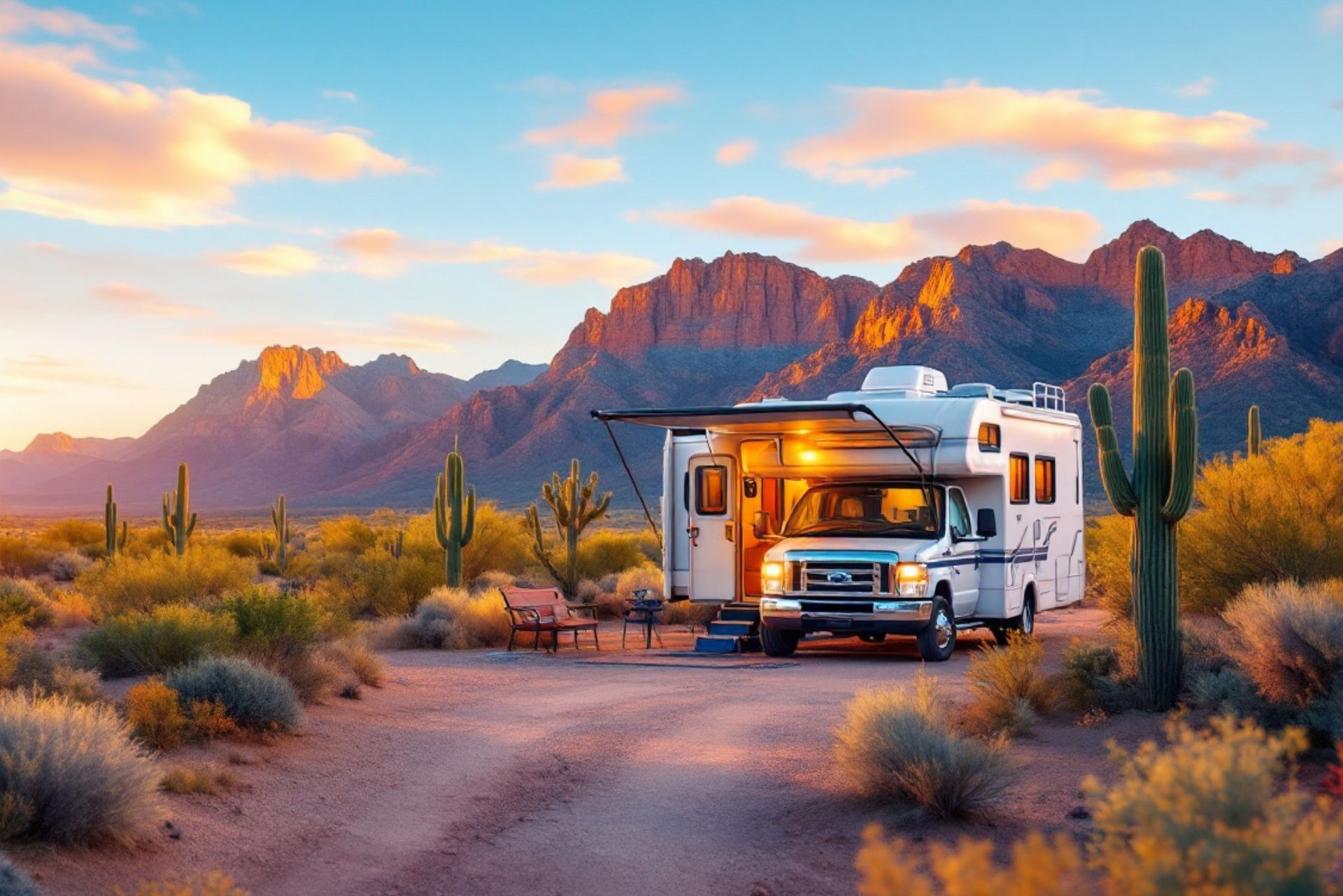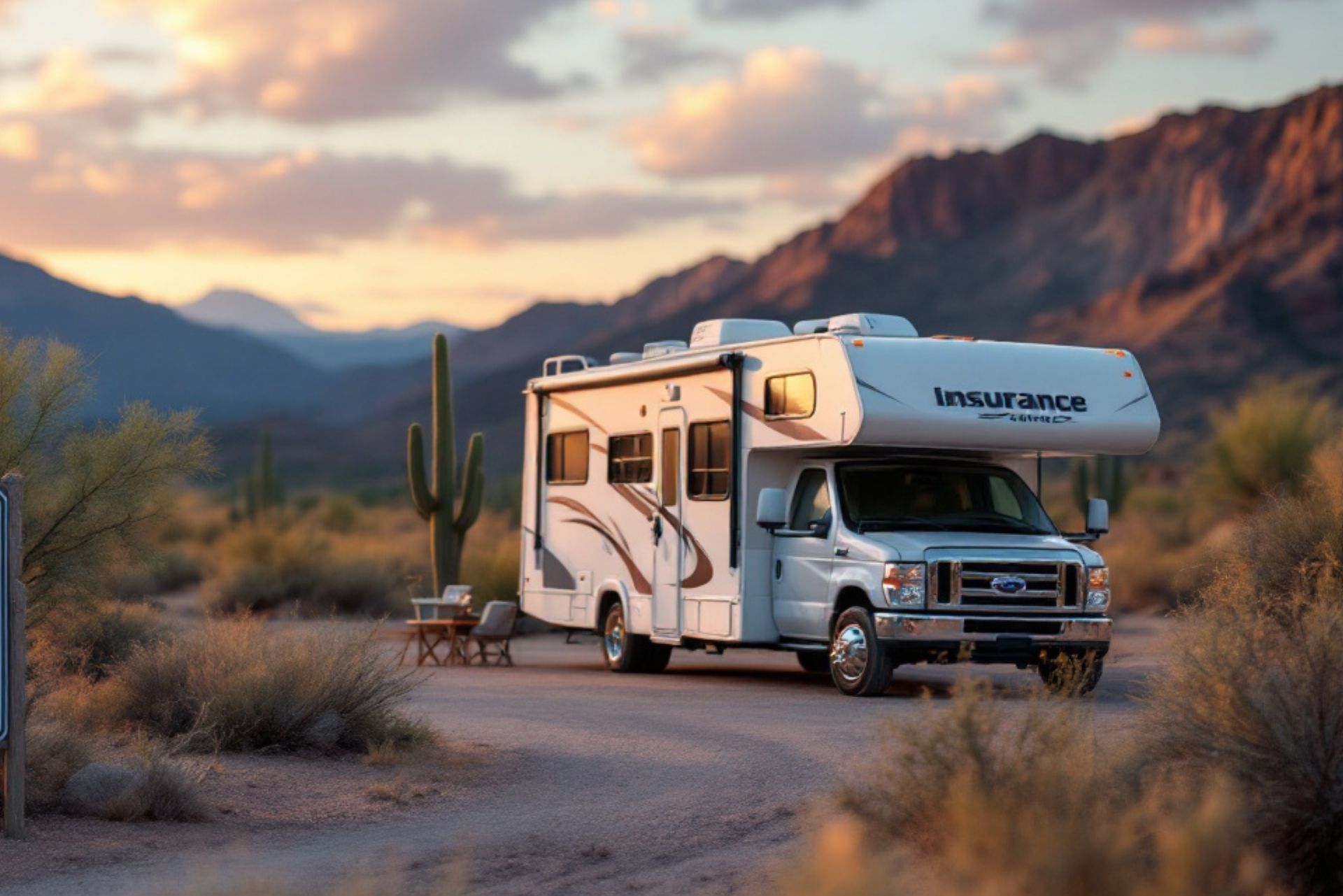
Most Common Personal Policies
Index
Contact Us
Traveling through the vast and beautiful landscapes of Arizona in an RV is an adventure like no other. From the majestic Grand Canyon to the serene deserts, the freedom of the open road beckons. However, before embarking on this journey, it's crucial to understand the importance of RV insurance. This article will provide a comprehensive guide to Arizona RV insurance, covering everything from types of coverage to tips for finding the best policy.
Understanding RV Insurance
RV insurance is designed to protect both the vehicle and its occupants. Unlike standard auto insurance, RV insurance takes into account the unique aspects of recreational vehicles, which can include living quarters, appliances, and other features. Understanding the nuances of RV insurance is essential for any RV owner. With the growing popularity of road trips and outdoor adventures, more people are investing in RVs, making it crucial to comprehend the specific insurance needs that come with these vehicles.
What is RV Insurance?
RV insurance is a specialized form of insurance that covers recreational vehicles, including motorhomes, travel trailers, and fifth wheels. It provides protection against physical damage, liability, and personal injury. Depending on the policy, it may also cover personal belongings and additional living expenses in case of an accident. Furthermore, many RV insurance policies offer options for roadside assistance, which can be invaluable for those traveling in remote areas where help may not be readily available. This added layer of protection ensures that RV owners can handle unexpected breakdowns or emergencies with greater ease.
Why is RV Insurance Important?
Having RV insurance is not just a legal requirement in Arizona; it also serves as a financial safety net. Accidents can happen, and without adequate coverage, the costs associated with repairs, medical bills, and liability claims can be overwhelming. Insurance helps mitigate these risks, allowing RV owners to enjoy their travels with peace of mind. Additionally, RV insurance can provide coverage for personal items stored within the vehicle, such as camping gear, electronics, and other valuables. This is particularly important for those who use their RVs as a second home, as the loss of these items can significantly impact the overall travel experience.
Moreover, RV insurance can vary widely in terms of coverage options and premiums, making it essential for owners to shop around and compare policies. Factors such as the type of RV, its age, and how often it is used can influence the cost of insurance. Many insurers also offer discounts for safe driving records, bundling policies, or for RV owners who participate in certain clubs or organizations. By understanding these variables, RV owners can tailor their insurance to best fit their individual needs and ensure they are adequately protected on the road.

Types of RV Insurance Coverage
When it comes to RV insurance, there are several types of coverage available. Understanding these options can help RV owners choose the right policy for their needs.
Liability Coverage
Liability coverage is a mandatory component of any RV insurance policy. It protects the policyholder against claims resulting from bodily injury or property damage caused by the RV. In Arizona, the minimum liability coverage required is $15,000 for bodily injury per person, $30,000 per accident, and $10,000 for property damage. It’s important to consider that these minimums may not be sufficient in the event of a serious accident, where medical bills and damages can quickly exceed these limits. Therefore, many RV owners opt for higher liability limits to ensure they are adequately protected, especially when traveling through densely populated areas or on busy highways.
Collision Coverage
Collision coverage pays for damages to the RV resulting from a collision with another vehicle or object, regardless of who is at fault. This type of coverage is especially important for motorhomes and larger RVs, as repair costs can be significant. Additionally, it can cover incidents such as rollovers or collisions with stationary objects like trees or guardrails. RV owners should also be aware that collision coverage typically comes with a deductible, which is the amount the policyholder must pay out of pocket before the insurance kicks in. Choosing a higher deductible can lower premium costs, but it’s essential to balance this with the potential financial burden in the event of an accident.
Comprehensive Coverage
Comprehensive coverage protects against non-collision-related incidents, such as theft, vandalism, fire, or
natural disasters. For RV owners, this coverage is crucial, as it safeguards the investment in the vehicle and its contents. Given the mobile nature of RV living, the risk of theft or damage can be higher, especially when parked in unfamiliar areas. Furthermore, comprehensive coverage can also extend to personal belongings inside the RV, offering peace of mind for travelers who carry valuable items. Many policies also include coverage for roadside assistance, which can be a lifesaver in the event of a breakdown or emergency while on the road. This added layer of protection not only enhances the overall security of the RV but also ensures that owners can enjoy their travels with less worry about unforeseen incidents.
Factors Affecting RV Insurance Rates in Arizona
Several factors influence the cost of RV insurance in Arizona. Understanding these factors can help RV owners find the most affordable and suitable coverage.
Type and Age of the RV
The type and age of the RV play a significant role in determining insurance rates. Newer and more expensive models typically come with higher premiums due to their higher replacement costs. Conversely, older RVs may have lower premiums but could require more frequent repairs. Additionally, specialized RVs, such as those designed for off-road use or luxury models with advanced technology, may incur higher insurance costs due to their unique features and increased risk of theft or damage.
Driving History
An individual's driving history is another critical factor. A clean driving record with no accidents or traffic violations can lead to lower insurance rates. On the other hand, a history of accidents or claims may result in higher premiums. Insurers often look at the length of time a driver has held a license and their experience with RVs specifically. Newer drivers or those with limited RV experience may face higher rates, as insurers consider them to be at a greater risk for accidents.
Usage and Mileage
The way an RV is used also affects insurance rates. Full-time RVers may face higher premiums compared to those who use their RVs seasonally. Additionally, the estimated mileage driven annually can impact costs; more miles typically lead to higher rates. RV owners who frequently travel to various states may also need to consider how different state regulations and insurance requirements can affect their overall coverage and premiums. Furthermore, those who participate in RV clubs or communities might have access to group insurance discounts, which can help mitigate costs.
Finding the Right RV Insurance in Arizona
Finding the right RV insurance policy can be a daunting task. However, with the right approach, RV owners can secure the best coverage at an affordable price. Arizona's diverse landscapes, from the Grand Canyon to the Sonoran Desert, make it a popular destination for RV enthusiasts. Understanding the unique risks associated with traveling in this state, such as extreme weather conditions and varying terrain, is essential when selecting an insurance plan that provides adequate protection.
Research and Compare Quotes
One of the most effective ways to find the right insurance is to research and compare quotes from multiple providers. Online comparison tools can simplify this process, allowing RV owners to evaluate coverage options and premiums side by side. Additionally, reading customer reviews and testimonials can offer insights into the reliability and customer service of different insurers. This step is crucial, as it helps to identify not only the best rates but also the most reputable companies that will be there when you need them the most.
Consider Bundling Policies
Many insurance companies offer discounts for bundling multiple policies, such as RV and home or auto insurance. This can lead to significant savings while ensuring comprehensive coverage for all vehicles and properties. Furthermore, bundling can simplify your insurance management, as you’ll be dealing with a single provider for multiple policies, making it easier to track payments and renewals. It's worth asking your insurer about any additional discounts that may apply, such as those for safe driving or membership in RV clubs.
Consult with an Insurance Agent
Consulting with an insurance agent who specializes in RV insurance can provide valuable insights. An experienced agent can help navigate the complexities of coverage options and tailor a policy that meets specific needs and budgets. They can also offer guidance on additional coverage options, such as roadside assistance or vacation liability, which can be particularly beneficial for those who frequently travel or stay in RV parks. Moreover, agents can help clarify any confusing terms or conditions in the policy, ensuring that RV owners fully understand their coverage and can make informed decisions.
In addition to these considerations, it's important for RV owners to assess their individual usage patterns. For instance, those who use their RVs year-round may require different coverage than those who only take them out for seasonal trips. Understanding your own driving habits, the age and condition of your RV, and any modifications made can also influence the type of insurance needed. By taking the time to evaluate these factors, RV owners can better align their insurance choices with their lifestyle, ultimately leading to more effective and personalized coverage.
Common Exclusions in RV Insurance Policies
While RV insurance provides extensive coverage, there are common exclusions that policyholders should be aware of. Understanding these exclusions can prevent surprises when filing a claim.
Wear and Tear
Most RV insurance policies do not cover damages resulting from normal wear and tear. This includes mechanical failures, routine maintenance, and deterioration over time. RV owners should budget for regular maintenance to keep their vehicles in good condition. It’s advisable to follow a strict maintenance schedule, which includes checking the engine, brakes, tires, and plumbing systems. By doing so, owners can not only prolong the lifespan of their RV but also potentially avoid costly repairs that could arise from neglect.
Intentional Damage
Insurance policies typically exclude coverage for damages caused intentionally. Any act of vandalism or destruction of property by the owner will not be covered, emphasizing the importance of responsible RV ownership. This exclusion serves as a reminder that insurance is designed to protect against unforeseen accidents, not reckless behavior. Furthermore, engaging in any form of intentional damage can lead to legal repercussions beyond the insurance implications, highlighting the need for RV owners to practice safety and care while enjoying their travels.
Business Use
Using an RV for business purposes, such as rentals or commercial activities, often requires a separate commercial policy. Personal RV insurance will not cover damages incurred while the vehicle is being used for business activities. This distinction is crucial for those who may consider leveraging their RV for income, such as offering it for rent on platforms like Outdoorsy or RVshare. Owners should thoroughly research and understand the specific requirements for commercial RV insurance, as these policies often include different coverage limits and premium structures tailored to the unique risks associated with business use.
Tips for Reducing RV Insurance Costs
Reducing RV insurance costs is a priority for many owners. Fortunately, there are several strategies that can help lower premiums without sacrificing coverage.
Increase Deductibles
One effective way to lower insurance premiums is to increase deductibles. A higher deductible means that the policyholder will pay more out of pocket in the event of a claim, but it can significantly reduce monthly premiums. It's essential to weigh the potential savings against the financial risk involved, as a higher deductible could lead to unexpected expenses if an accident occurs.
Maintain a Good Credit Score
Insurance companies often consider credit scores when determining premiums. Maintaining a good credit score can lead to lower rates. Paying bills on time and managing debt responsibly can positively impact credit scores. Additionally, reviewing credit reports regularly for errors and disputing any inaccuracies can further enhance your credit profile, potentially resulting in even more savings on insurance costs.
Take Advantage of Discounts
Many insurance providers offer various discounts that can help reduce costs. These may include discounts for safe driving, completing RV safety courses, or being a member of certain organizations. It’s worth inquiring about available discounts when shopping for insurance. Furthermore, some insurers provide discounts for bundling policies, such as combining RV insurance with home or auto insurance, which can lead to substantial savings.
Limit Mileage
Another strategy to consider is limiting the mileage on your RV. Many insurance companies offer lower rates for vehicles that are used less frequently. By keeping your RV stored and only using it for occasional trips, you can qualify for a low-mileage discount. This not only helps reduce insurance costs but also encourages responsible usage, ensuring that your RV remains in good condition for those special outings.
Choose the Right Coverage
Choosing the right type of coverage is crucial in managing insurance costs. While it may be tempting to opt for the minimum required coverage, it’s important to assess your specific needs and risks. Comprehensive coverage may be more beneficial in the long run, especially for newer or more valuable RVs. Additionally, consider reviewing your policy annually to ensure it aligns with your current lifestyle and usage patterns, as changes could open up new opportunities for savings.

Understanding Arizona's RV Insurance Laws
Arizona has specific laws regarding RV insurance that all owners should be aware of. Understanding these regulations can help ensure compliance and avoid penalties.
Minimum Coverage Requirements
As mentioned earlier, Arizona requires RV owners to carry minimum liability coverage. It's essential to meet these requirements to avoid legal repercussions and fines. However, many experts recommend purchasing higher limits to ensure adequate protection.
Registration and Insurance Verification
In Arizona, RV owners must provide proof of insurance when registering their vehicles. This verification process ensures that all RVs on the road are adequately insured, promoting safety and accountability among drivers.
Conclusion
Arizona RV insurance is a vital aspect of responsible RV ownership. By understanding the types of coverage available, factors affecting rates, and the importance of compliance with state laws, RV owners can make informed decisions. Whether exploring the stunning landscapes of Arizona or embarking on a cross-country adventure, having the right insurance coverage allows for peace of mind and enjoyment on the road.
In summary, investing time in researching and comparing RV insurance options can lead to significant savings and better coverage. With the right policy in place, RV owners can focus on what truly matters: creating unforgettable memories on their journeys.
